Study: Tuberculosis survives by using host system against itself
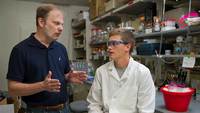
In a new study published in the Journal of Experimental Medicine, scientists at the University of Notre Dame have discovered that the pathogen Mycobacterium tuberculosis (MTB) releases RNA into infected cells.
Zhang lands DOD breast cancer research award

Siyuan Zhang, the Dee Associate Professor of Biological Sciences who is also affiliated with the Harper Cancer Research Institute, landed a nearly $1.1 million Breast Cancer Research Program Breakthrough Award through the Department of Defense in August.
The Graduate School Launches Training Program for Leaders Advancing Socially Engaged Research (LASER)
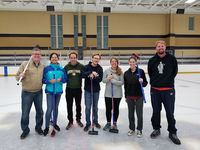
This year, the Graduate School launched a new experiential training program focused on leadership skills and social responsibility. Leaders Advancing Socially Engaged Research, or LASER, is aimed at Notre Dame doctoral students in their 3rd or 4th years of study, and is intended to complement students’ individual research pursuits in their various fields. This year’s cohort consists of seventeen students completing individual LASER projects and hailing from each of the Graduate School’s four academic disciplines (engineering, humanities, social sciences, and science).
Scientists neutralize reactive nitrogen molecules to enhance cancer immunotherapy

Immunotherapy — harnessing T-cells to attack cancer cells in the body — has given hope to patients who endure round after round of treatment, including chemotherapy, to little effect. For all of its promise, however, immunotherapy still benefits only a minority of patients — a reality driving research in the field for ways to improve the relatively new approach. One method for improving efficacy is the development of bio- and activity-based markers to better predict which patients will respond to immunotherapy and identify why some don’t. In a new study in the Proceedings of the National Academy of Sciences, researchers at the University of Notre Dame studying tumors in prostate cancer models found that nitration of an amino acid can inhibit T-cell activation, thwarting the T-cell’s ability to kill cancer cells.
Committee identifies priorities for nation’s future water resource challenges
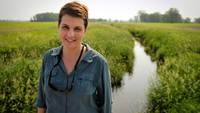
Jennifer Tank, Galla Professor of Biological Sciences and director of the Notre Dame Environmental Change Initiative, served as one of 15 experts on the National Academies of Sciences, Engineering, and Medicine's Committee on Future Water Resource Needs for the Nation.
Notre Dame researcher to study dengue virus vaccine
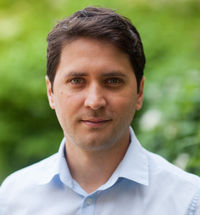
Guido Camargo España Guido Camargo España, postdoctoral research associate of biological sciences, has received a Postdoctoral Training Award in Translational Research from the Indiana…
Lu receives Susan G. Komen grant to study how breast cancer spreads

Xin Lu, the John M. and Mary Jo Boler Assistant Professor of biology, was awarded a 2018 Susan G. Komen research grant to identify potential new therapies for treating metastatic breast cancer.
Sophomore biology student spends summer in India doing research

During her first year at Notre Dame, Elsa Barron was on the lookout for a summer experience that would tie together her interests in science and international affairs. A biology and peace studies double major, Barron, now a sophomore, found what she was looking for in India after becoming Notre Dame’s first undergraduate Bose Scholar.
Lamberti honored as a Fellow of the Society for Freshwater Science
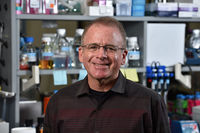
Ask Gary A. Lamberti, professor in the Department of Biological Sciences, to name his favorite creature, and it takes him only a few seconds to think before saying, “a caddisfly larva” or, as it is known in science circles, Helicopsyche borealis. He not only mounted a drawing of this common but extraordinary bug on his office wall in the Galvin Life Science Center, but also had it embroidered on baseball caps worn by his students. His enthusiasm hasn’t gone unnoticed by his peers. Lamberti recently was elected as a fellow of the Society for Freshwater Science, the leading international freshwater organization. The distinction recognizes sustained excellence in contributions to freshwater science, research, policy, or management. Lamberti, a member of the society for 35 years and president in 1998, said it is very rewarding and a particular honor to be recognized for his work.
Neuroscience professor earns Frank O'Malley Undergraduate Teaching Award

Nancy Michael, assistant teaching professor in the Department of Biological Sciences and director of undergraduate studies for the neuroscience and behavior major, earned the 2018 Frank O'Malley Undergraduate Teaching Award, an annual prize that honors any faculty member who displays “outstanding service to the students of the Notre Dame community.”
Eck Institute for Global Health announces new graduate student fellows
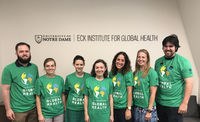
Seven University of Notre Dame graduate students have successfully received fellowships from the Eck Institute for Global Health (EIGH). The EIGH Graduate Student Fellowship Program was established to support students enrolled in the Notre Dame doctorate program who have an interest in global health research. “This fellowship program provides an opportunity for Notre Dame graduate students to work with our faculty and become more directly engaged in the fight for global health,” said Bernard Nahlen, director of the EIGH and professor of biological sciences. “I look forward to seeing how these young researchers develop their own skills and interests to contribute to better health for everyone, everywhere.”
What makes a good malaria vector?
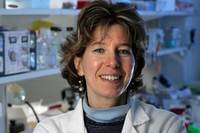
Nora J. Besansky, the O'Hara Professor and Associate Chair in the Department of Biological Sciences, hypothesizes in a recent paper in the Proceedings of the National Academy of Sciences that if scientists can understand what makes a small group of Anopheles mosquito a strong malaria vector, then perhaps we can prevent the spread of disease.
Jenna Davidson wins AAUW Fellowship

Jenna Davidson recently won an American Fellowship from the American Association of University Women (AAUW), a group aiming to empower women and girls through research, scholarship, and community projects.
Hackathons may accelerate scientific discovery, study finds
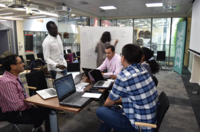
From interdisciplinary teams to multi-institutional partnerships, collaborations in research have become commonplace. However, these interactions are often made up of siloed teams who pass information along a pipeline rather than operating cohesively. In a new study, researchers have shown how hackathons, or other crowdsourcing events, may provide a good strategy for building bridges over the traditional divides of research partnerships and accelerate scientific discovery.
Daniel Erickson Named 2018 Berry Family Foundation Graduate Fellow

Daniel Erickson, 2018 Berry Family Foundation Graduate Fellow Daniel Erickson, graduate student of biological sciences, has been awarded a fellowship through the Advanced Diagnostics & Therapeutics (AD&T) Berry Family Foundation Graduate Fellowships for his research in the lab of Malcolm J. Fraser Jr., Rev. Julius A. Nieuwland, C.S.C. Professor of Biological Sciences, developing transgenic silkworms which produce silk that could become a low-cost source of cancer therapies.
Undergraduate research highlighted at 12th annual COS-JAM
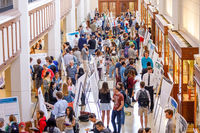
From poster sessions to presentations, the College of Science Joint Annual Meeting (COS-JAM) on May 4, 2018, showcased the depth of undergraduate research completed by students within the fields of science and engineering. Eighty-nine students presented posters and 23 gave oral presentations during sessions held in the Jordan Hall of Science. Hundreds of students, professors and others met with the presenters to learn more about their work. Presenting to peers at COS-JAM is a low-stakes way for students to develop experience sharing their research. It is a skill they will use as they advance to graduate school and the workplace. “Scientific communication, like presentations at COS-JAM, is an integral part of research,” said Xuemin Lu, undergraduate research director for the College of Science and assistant teaching professor in the Department of Biological Sciences.
Senior Science students honored at Dean's Awards Luncheon
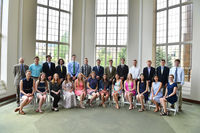
On Friday, May 18, 2018, more than 50 seniors were honored during The Dean’s Awards luncheon held in the Jordan Hall of Science Galleria. Mary Galvin, William K. Warren Foundation Dean of the College of Science, introduced Andrew Grose as Valedictorian and Harisa Spahić as Salutatorian to the crowd of more than 200 students, families, and faculty members who gathered together to celebrate the students’ accomplishments. Each year the Dean’s Award is presented to an outstanding graduating senior in the College of Science in recognition of exemplary personal character, leadership, service and outstanding achievement. The 2018 recipient was Luke Maillie, a Physics-in-Medicine major with honors and an International Development Studies minor. His exceptional academic performance is only one of many achievements that highlight his career at Notre Dame.
2018 Equipment Restoration and Renewal Grant awardees announced
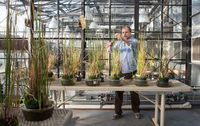
Notre Dame Research has provided six researchers or research groups from three Colleges and Schools with awards from the Equipment and Restoration Renewal (ERR) grant program for 2018. The ERR grant program was created to assist in the restoration, replacement, and renewal of the facilities needed for faculty research at the University of Notre Dame.
Two College of Science professors in Michiana's 2018 "Forty under 40" class

A blend of dedication to the community and a joyful work ethic landed two science professors in the spotlight as they were inducted into the 2018 Michiana Forty under 40 class. The inductees from the College of Science were Nancy Michael, assistant teaching professor and director of undergraduate studies, Neuroscience and Behavior; and Jenifer Prosperi, adjunct assistant professor in the Department of Biological Sciences at Notre Dame and member of Harper Cancer Research Institute, as well as assistant professor of biochemistry and molecular biology, Indiana University School of Medicine–South Bend. A third inductee from Notre Dame was Regan Jones, the University’s director for military and veterans affairs.
Dengue virus transmission dominated by those with undetected infection, study finds
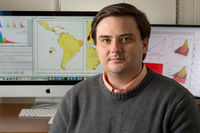
People showing virtually no symptoms are likely the primary source of dengue fever, according to new research published in PLOS Pathogens. Nearly 400 million people each year are infected with dengue virus, which is transmitted through mosquitoes. The study estimates that more than 80 percent of dengue virus infections are attributable to individuals with mild to no symptoms who do not seek treatment from a physician. The study also indicates that nearly a quarter of dengue virus transmission is the result of mosquitoes biting those already infected before the onset of symptoms. By the time those symptoms appear, the opportunity to prevent the virus from spreading has passed.
Winners Declared in 2018 3MT® College of Science Qualifying Round
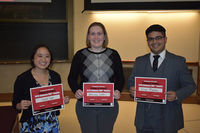
Cool temps did nothing to chill the heated competition among College of Science Shaheen 3MT competitors Tuesday night at Jordan Hall of Science. Sara Lum (Chemistry), Whitney Liske (Math), and Elvin Morales (Biology) took the top three spots, and will go on to compete at the 3MT® Finals event on April 23 in Jordan Auditorium, Mendoza College of Business. There they will face finalists from the College of Engineering and the College of Arts and Letters.
Faculty awards honor undergraduate teaching and advising

Twenty University faculty members have received Rev. Edmund P. Joyce, C.S.C., Awards for Excellence in Undergraduate Teaching, and three have been honored with Dockweiler Awards for Excellence in Undergraduate Advising.
University of Notre Dame researcher receives Indiana CTSI postdoctoral award
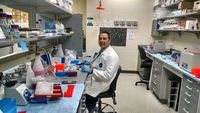
Henry Clay Conner, University of Notre Dame postdoctoral scholar, has received a Postdoctoral Training Award in Translational Research from the Indiana Clinical and Translational Sciences Institute (CTSI). The award will be used for his work in Athanasia Panopoulos’s lab.
Biological Sciences graduate student selected to attend National Graduate Student Symposium at St. Jude Children’s Research Hospital
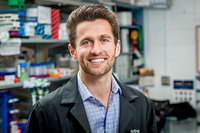
Every spring, St. Jude Children’s Research Hospital hosts the National Graduate Student Symposium (NGSS). The Symposium is held for the nation’s top Ph.D. students to present their work and learn more about St. Jude’s advanced research and facilities, which is located in Memphis, Tenn. This year, among more than 1500 applicants who had to be invited to apply, only 41 were selected. Notre Dame biology graduate student Mark Hawk is among this year’s attendees.
Natural bacterial proteins may prove viable alternatives to antibiotics
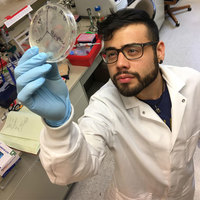
Tiny proteins found in the genomes of some types of bacteria are effective weapons against a wide range of other bacteria, opening the door for the development of new therapies in the age of antibiotic resistance, according to new research at the University of Notre Dame.
Theology, ethics and…salmon? Unlikely trio finds unity in Laudato si’
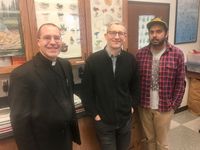
Notre Dame research by Dominic Chaloner, Bharat Ranganathan, and Fr. Terrence Ehrman, C.S.C. sought to explore the principles of integral ecology set forth in Pope Francis’ 2015 encyclical Laudato si’- "On Care For Our Common Home."
Women lead: Progress is made in the details outside the frame

On the occasion of International Women's Day 2018, meet seven scholars whose work is inspiring others to #PressForProgress.
Mapping the burden of cholera in sub-Saharan Africa

Sean Moore, a research assistant professor in the Department of Biological Sciences and the Eck Institute for Global Health, has coauthored a paper mapping the incidence of cholera in Africa, a critical step in the World Health Organization’s goal of reducing cholera deaths by 90 percent over the next decade. “Mapping the burden of cholera in sub-Saharan Africa and implications for control: an analysis of data across geographical scales” appeared in The Lancet on March 1, 2018. The mapping enables targeted application of cholera elimination strategies to high-incidence areas for most immediate and effective control. Reports often aggregate cases for a whole country and do not identify high-incidence areas within the country.
As climate changes, so could the genes of the Eastern tiger swallowtail butterfly
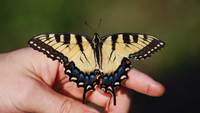
The reality of climate change poses a significant threat to global biodiversity. As temperatures rise, the survival of individual species will ultimately depend on their ability to adapt to changes in habitat and their interactions with other species. A new study published in the Proceedings of the National Academy of Sciences examines movement of the Eastern (Papilio glaucus) and Canadian (Papilio Canadensis) tiger swallowtail butterfly over a 32-year period within the geographic region where the two species mate, called the hybrid zone. The findings highlight the impact of changing climates and provide critical information for the protection and management of biodiversity.
Researchers discover novel mechanism linking changes in mitochondria to cancer cell death
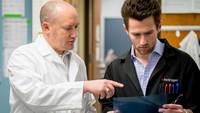
To stop the spread of cancer, cancer cells must die. Unfortunately, many types of cancer cells seem to use innate mechanisms that block cancer cell death, therefore allowing the cancer to metastasize. While seeking to further understand cancer cell death, researchers at the University of Notre Dame discovered that the activation of a specific enzyme may help suppress the spread of tumors. The findings, published in Nature Cell Biology, demonstrate that the enzyme RIPK1 decreases the number of mitochondria in a cell. This loss of mitochondria leads to oxidative stress that can potentially kill cancer cells, though researchers speculate the cancer cells could find ways to shut down this effect.